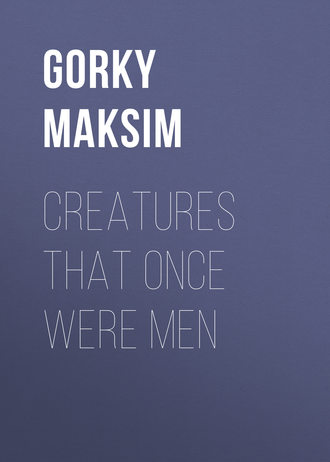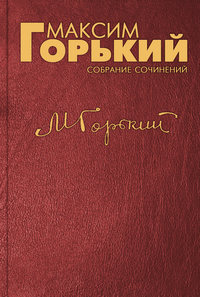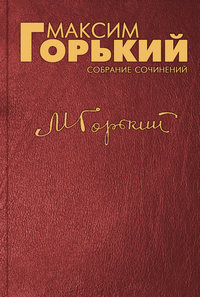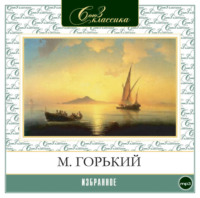 полная версия
полная версияCreatures That Once Were Men
"I? I was ruined by love of life.. Fool that I was, I loved life, but the merchant spoils it, and I cannot bear it, simply for this reason, and not because I am a nobleman. But if you want to know the truth, I was once a man, though I was not noble. I care now for nothing and nobody.. and all my life has been tame – a sweetheart who has jilted me – therefore I despise life, and am indifferent to it."
"You lie!" says Abyedok.
"I lie?" roars Aristid Kuvalda, almost crimson with anger.
"Why shout?" comes in the cold sad voice of Martyanoff.
"Why judge others? Merchants, noblemen..what have we to do with them?"
"Seeing what we are".. puts in Deacon Taras.
"Be quiet, Abyedok," says the teacher good-naturedly.
"Why do you provoke him?" He does not love either discussion or noise, and when they quarrel all around him his lips form into a sickly grimace, and he endeavors quietly and reasonably to reconcile each with the other, and if he does not succeed in this he leaves the company. Knowing this, the Captain, if he is not very drunk, controls himself, not wishing to lose, in the person of the teacher, one of the best of his listeners.
"I repeat," he continues, in a quieter tone, "that I see life in the hands of enemies, not only enemies of the noble but of everything good, avaricious and incapable of adorning existence in any way."
"But all the same, says the teacher, "merchants, so to speak, created Genoa, Venice, Holland – and all these were merchants, merchants from England, India, the Stroyanoff merchants.."
"I do not speak of these men, I am thinking of Judas Petunikoff, who is one of them.."
"And you say you have nothing to do with them?" asks the teacher quietly.
"But do you think that I do not live? Aha! I do live, but I suppose I ought not to be angry at the fact that life is desecrated and robbed of all freedom by these men."
"And they dare to laugh at the kindly anger of the Captain, a man living in retirement?" says Abyedok teasingly.
"Very well! I agree with you that I am foolish. Being a creature who was once a man, I ought to blot out from my heart all those feelings that once were mine. You may be right, but then how could I or any of you defend ourselves if we did away with all these feelings?"
"Now then, you are talking sense," says the teacher encouragingly.
"We want other feelings and other views on life.. We want something new..because we ourselves are a novelty in this life.."
"Doubtless this is most important for us," remarks the teacher.
"Why?" asks Kanets. "Is it not all the same whatever we say or think? We have not got long to live I am forty, you are fifty.. there is no one among us younger than thirty, and even at twenty one cannot live such a life long."
"And what kind of novelty are we?" asked Abyedok mockingly.
"Since nakedness has always existed"
"Yes, and it created Rome," said the teacher.
"Yes, of course," says the Captain, beaming with joy.
"Romulus and Remus, eh? We also shall create when our time comes.."
"Violation of public peace," interrupts Abyedok. He laughs in a self-satisfied way. His laughter is impudent and insolent, and is echoed by Simtsoff, the Deacon and Paltara Taras. The naive eyes of young Meteor light up, and his cheeks flush crimson.
Kanets speaks, and it seems as if he were hammering their heads.
"All these are foolish illusions.. fiddlesticks!"
It was strange to see them reasoning in this manner, these outcasts from life, tattered, drunken with vodki and wickedness, filthy and forlorn. Such conversations rejoiced the Captain's heart. They gave him an opportunity of speaking more, and therefore he thought himself better than the rest. However low he may fall, a man can never deny himself the delight of feeling cleverer, more powerful, or even better fed than his companions. Aristid Kuvalda abused this pleasure, and never could have enough of it, much to the disgust of Abyedok, Kubar, and others of these creatures that once were men, who were less interested in such things.
Politics, however, were more to the popular taste.
The discussions as to the necessity of taking India or of subduing England were lengthy and protracted.
Nor did they speak with less enthusiasm of the radical measure of clearing Jews off the face of the earth. On this subject Abyedok was always the first to propose dreadful plans to effect the desired end, but the Captain, always first in every other argument, did not join in this one. They also spoke much and impudently about women, but the teacher always defended them, and sometimes was very angry when they went so far as to pass the limits of decency. They all, as a rule, gave in to him, because they did not look upon him as a common person, and also because they wished to borrow from him on Saturdays the money which he had earned during the week. He had many privileges. They never beat him, for instance, on these occasions when the conversation ended in a free fight. He had the right to bring women into the dosshouse; a privilege accorded to no one else, as the Captain had previously warned them.
"No bringing of women to my house," he had said. "Women, merchants and philosophers, these are the three causes of my ruin. I will horsewhip anyone bringing in women. I will horsewhip the woman also.. And as to the philosopher, I'll knock his head off for him." And notwithstanding his age he could have knocked anyone's head off, for he possessed wonderful strength. Besides that, whenever he fought or quarrelled, he was assisted by Martyanoff, who was accustomed during a general fight to stand silently and sadly back to back with Kuvalda, when he became an all destroying and impregnable engine of war. Once when Simtsoff was drunk, he rushed at the teacher for no reason whatever, and getting hold of his head tore out a bunch of hair.
Kuvalda, with one stroke of his fist in the other's chest, sent him spinning, and he fell to the ground. He was unconscious for almost half-an-hour, and when he came to himself Kuvalda compelled him to eat the hair he had torn from the teacher's head. He ate it, preferring this to being beaten to death.
Besides reading newspapers, fighting and indulging in general conversation, they amused themselves by playing cards.
They played without Martyanoff because he could not play honestly.
After cheating several times, he openly confessed:
"I cannot play without cheating.. it is a habit of mine."
"Habits do get the better of you," assented Deacon Taras. "I always used to beat my wife every Sunday after Mass, and when she died I cannot describe how extremely dull I felt every Sunday. I lived through one Sunday – it was dreadful, the second I still controlled myself, the third Sunday I struck my Asok… She was angry and threatened to summon me. Just imagine if she had done so! On the fourth Sunday, I beat her just as if she were my own wife! After that I gave her ten roubles, and beat her according to my own rules till I married again!"
"You are lying, Deacon! How could you marry a second time?" interrupted Abyedok.
"Ay, just so.. She looked after my house."
"Did you have any children?" asked the teacher.
"Five of them.. One was drowned.. the oldest.. he was an amusing boy! Two died of diphtheria.. One of the daughters married a student and went with him to Siberia.
"The other went to the University of St. Petersburg and died there.. of consumption they say. Ye – es, there were five of them.. Ecclesiastics are prolific, you know." He began explaining why this was so, and they laughed till they nearly burst at his tales. When the laughter stopped, Aleksei Maksimovitch Simtsoff remembered that he too had once had a daughter.
"Her name was Lidka.. she was very stout.."
More than this he did not seem to remember, for he looked at them all, was silent and smiled.. in a guilty way. Those men spoke very little to each other about their past, and they recalled it very seldom, and then only its general outlines. When they did mention it, it was in a cynical tone. Probably, this was just as well, since, in many people, remembrance of the past kills all present energy and deadens all hope for the future.
* * * * * * * * * *On rainy, cold, or dull days in the late autumn, these "creatures that once were men" gathered in the eating-house of Vaviloff. They were well known there, where some feared them as thieves and rogues, and some looked upon them contemptuously as hard drinkers, although they respected them, thinking that they were clever.
The eating-house of Vaviloff was the club of the main street, and the "creatures that once were men" were its most intellectual members.
On Saturday evenings or Sunday mornings, when the eating-house was packed, the "creatures that once were men" were only too welcome guests. They brought with them, besides the forgotten and poverty-stricken inhabitants of the street, their own spirit, in which there was something that brightened the lives of men exhausted and worn out in the struggle for existence, as great drunkards as the inhabitants of Kuvalda's shelter, and, like them, outcasts from the town. Their ability to speak on all subjects, their freedom of opinion, skill in repartee, courage in the presence of those of whom the whole street was in terror, together with their daring demeanor, could not but be pleasing to their companions. Then, too, they were well versed in law, and could advise, write petitions, and help to swindle without incurring the risk of punishment. For all this they were paid with vodki and flattering admiration of their talents.
The inhabitants of the street were divided into two parties according to their sympathies. One was in favor of Kuvalda, who was thought "a good soldier, clever, and courageous"; the other was convinced of the fact that the teacher was "superior" to Kuvalda. The latter's admirers were those who were known to be drunkards, thieves, and murderers, for whom the road from beggary to prison was inevitable. But those who respected the teacher were men who still had expectations, still hoped for better things, who were eternally occupied with nothing, and who were nearly always hungry.
The nature of the teacher's and Kuvalda's relations toward the street may be gathered from the following:
Once in the eating-house they were discussing the resolution passed by the Corporation regarding the main street, viz., that the inhabitants were to fill up the pits and ditches in the street, and that neither manure nor the dead bodies of domestic animals should be used for the purpose, but only broken tiles, etc., from the ruins of other houses.
"Where am I going to get these same broken tiles and bricks? I could not get sufficient bricks together to build a hen-house," plaintively said Mokei Anisimoff, a man who hawked kalaches (a sort of white bread) which were baked by his wife.
"Where can you get broken bricks and lime rubbish? Take bags with you, and go and remove them from the Corporation buildings. They are so old that they are of no use to anyone, and you will thus be doing two good deeds; firstly, by repairing the main street; and secondly, by adorning the city with a new Corporation building."
"If you want horses, get them from the Lord Mayor, and take his three daughters, who seem quite fit for harness. Then destroy the house of Judas Petunikoff and pave the street with its timbers. By the way, Mokei, I know out of what your wife baked to-day's kalaches; out of the frames of the third window and the two steps from the roof of Judas' house."
When those present had laughed and joked sufficiently over the Captain's proposal, the sober market gardener, Pavlyugus asked:
"But seriously, what are we to do, your honor?.. Eh?
What do you think?"
"I? I shall neither move hand nor foot. If they wish to clean the street, let them do it."
"Some of the houses are almost coming down.."
"Let them fall; don't interfere; and when they fall ask help from the city. If they don't give it you, then bring a suit in court against them! Where does the water come from? From the city! Therefore let the city be responsible for the destruction of the houses."
"They will say it is rain-water."
"Does it destroy the houses in the city? Eh? They take taxes from you, but they do not permit you to speak! They destroy your property and at the same time compel you to repair it!" And half the radicals in the street, convinced by the words of Kuvalda, decided to wait till the rain-water came down in huge streams and swept away their houses. The others, more sensible, found in the teacher a man who composed for them an excellent and convincing report for the Corporation. In this report the refusal of the street's inhabitants to comply with the resolution of the Corporation was well explained that the Corporation actually entertained it. It was decided that the rubbish left after some repairs had been done to the barracks should be used for mending and filling up the ditches in their street, and for the transport of this five horses were given by the fire brigade. Still more, they even saw the necessity of laying a drain-pipe through the street. This and many other things vastly increased the popularity of the teacher. He wrote petitions for them and published various remarks in the newspapers.
For instance, on one occasion Vaviloff's customers noticed that the herrings and other provisions of the eating-house were not what they should be, and after a day or two they saw Vaviloff standing at the bar with the newspaper in his hand making a public apology.
"It is true, I must acknowledge, that I bought old and not very good herrings, and the cabbage.. also.. was old. It is only too well known that anyone can put many a five-kopeck piece in his pocket in this way. And what is the result? It has not been a success; I was greedy, I own, but the cleverer man has exposed me, so we are quits.."
This confession made a very good impression on the people, and it also gave Vaviloff the opportunity of still feeding them with herrings and cabbages which were not good, though they failed to notice it, so much were they impressed.
This incident was very significant, because it increased not only the teacher's popularity, but also the effect of press opinion.
It often happened, too, that the teacher read lectures on practical morality in the eating-house.
"I saw you," he said to the painter, Yashka Tyarin; "I saw you, Yakov, beating your wife.."
Yashka was "touched with paint" after having two glasses of vodki, and was in a slightly uplifted condition.
The people looked at him, expecting him to make a row, and all were silent.
"Did you see me? And how did it please you?" asks Yashka.
The people control their laughter.
"No; it did not please me," replies the teacher.
His tone is so serious that the people are silent.
"You see I was just trying it," said Yashka, with bravado, fearing that the teacher would rebuke him. "The wife is satisfied.. She has not got up yet today.."
The teacher, who was drawing absently with his fingers on the table, said, "Do you see, Yakov, why this did not please me?.. Let us go into the matter thoroughly, and understand what you are really doing, and what the result may be. Your wife is pregnant. You struck her last night on her sides and breast. That means that you beat not only her but the child too. You may have killed him, and your wife might have died or else have become seriously ill. To have the trouble of looking after a sick woman is not pleasant. It is wearing, and would cost you dear, because illness requires medicine, and medicine money. If you have not killed the child, you may have crippled him, and he will he born deformed, lop-sided, or hunch-backed. That means that he will not be able to work, and it is only too important to you that he should be a good workman. Even if he be born ill, it will be bad enough, because he will keep his mother from work, and will require medicine. Do you see what you are doing to yourself? Men who live by hard work must be strong and healthy, and they should have strong and healthy children.. Do I speak truly?"
"Yes," assented the listeners.
"But all this will never happen," says Yashka, becoming rather frightened at the prospect held out to him by the teacher.
"She is healthy, and I cannot have reached the child.. She is a devil – a hag!" he shouts angrily. "I would.. She will eat me away as rust eats iron."
"I understand, Yakov, that you cannot help beating your wife," the teacher's sad and thoughtful voice again breaks in. "You have many reasons for doing so.. It is your wife's character that causes you to beat her so incautiously.. But your own dark and sad life.."
"You are right!" shouts Yakov. "We live in darkness, like the chimney-sweep when he is in the chimney!"
"You are angry with your life, but your wife is patient; the closest relation to you – your wife, and you make her suffer for this, simply because you are stronger than she. She is always with you, and cannot get away. Don't you see how absurd you are?"
"That is so.. Devil take it! But what shall I do?
Am I not a man?"
"Just so! You are a man… I only wish to tell you that if you cannot help beating her, then beat her carefully and always remember that you may injure her health or that of the child. It is not good to beat pregnant women.. on their belly or on their sides and chests.. Beat her, say, on the neck.. or else take a rope and beat her on some soft place.."
The orator finished his speech and looked upon his hearers with his dark, pathetic eyes, seeming to apologize to them for some unknown crime.
The public understands it. They understand the morale of the creature who was once a man, the morale of the public-house and much misfortune.
"Well, brother Yashka, did you understand? See how true it is!"
Yakov understood that to beat her incautiously might be injurious to his wife. He is silent, replying to his companions' jokes with confused smiles.
"Then again, what is a wife?" philosophizes the baker, Mokei Anisimoff. "A wife.. is a friend if we look at the matter in that way. She is like a chain, chained to you for life.. and you are both just like galley slaves. And if you try to get away from her, you cannot, you feel the chain."
"Wait," says Yakovleff; "but you beat your wife too."
"Did I say that I did not? I beat her.. There is nothing else handy.. Do you expect me to beat the wall with my fist when my patience is exhausted?"
"I feel just like that too." says Yakov.
"How hard and difficult our life is, my brothers!
There is no real rest for us anywhere!"
"And even you beat your wife by mistake," some one remarks humorously. And thus they speak till far on in the night or till they have quarrelled, the usual result of drink or of passions engendered by such discussions.
The rain beats on the windows, and outside the cold wind is blowing. The eating-house is close with tobacco smoke, but it is warm, while the street is cold and wet. Now and then, the wind beats threateningly on the windows of the eating-house, as if bidding these men to come out and be scattered like dust over the face of the earth.
Sometimes a stifled and hopeless groan is heard in its howling which again is drowned by cold, cruel laughter. This music fills one with dark, sad thoughts of the approaching winter, with its accursed short, sunless days and long nights, of the necessity of possessing warm garments and plenty to eat. It is hard to sleep through the long winter nights on an empty stomach. Winter is approaching. Yes, it is approaching.. How to live?
These gloomy forebodings created a strong thirst among the inhabitants of the main street, and the sighs of the "creatures that once were men" increased with the wrinkles on their brows, their voices became thick and their behavior to each other more blunt. And brutal crimes were committed among them, and the roughness of these poor unfortunate outcasts was apt to increase at the approach of that inexorable enemy, who transformed all their lives into one cruel farce. But this enemy could not be captured because it was invisible.
Then they began beating each other brutally, and drank till they had drunk everything which they could pawn to the indulgent Vaviloff. And thus they passed the autumn days in open wickedness, in suffering which was eating their hearts out, unable to rise out of this vicious life and in dread of the still crueller days of winter.
Kuvalda in such cases came to their assistance with his philosophy.
"Don't lose your temper, brothers, everything has an end, this is the chief characteristic of life.
"The winter will pass, summer will follow.. a glorious time, when the very sparrows are filled with rejoicing." But his speeches did not have any effect – a mouthful of even the freshest and purest water will not satisfy a hungry man.
Deacon Taras also tried to amuse the people by singing his songs and relating his tales. He was more successful, and sometimes his endeavors ended in a wild and glorious orgy at the eating-house. They sang, laughed and danced, and for hours behaved like madmen. After this they again fell into a despairing mood, sitting at the tables of the eating-house, in the black smoke of the lamp and the tobacco; sad and tattered, speaking lazily to each other, listening to the wild howling of the wind, and thinking how they could get enough vodki to deaden their senses.
And their hand was against every man, and every man's hand against them.
PART II
All things are relative in this world, and a man cannot sink into any condition so bad that it could not be worse. One day, toward the end of September, Captain Aristid Kuvalda was sitting, as was his custom, on the bench near the door of the dosshouse, looking at the stone building built by the merchant Petunikoff close to Vaviloff's eating-house, and thinking deeply. This building, which was partly surrounded by woods, served the purpose of a candle factory.
Painted red, as if with blood, it looked like a cruel machine which, though not working, opened a row of deep, hungry, gaping jaws, as if ready to devour and swallow anything. The gray wooden eating-house of Vaviloff, with its bent roof covered with patches, leaned against one of the brick walls of the factory, and seemed as if it were some large form of parasite clinging to it. The Captain was thinking that they would very soon be making new houses to replace the old building. "They will destroy the dosshouse even," he reflected. "It will be necessary to look out for another, but such a cheap one is not to be found. It seems a great pity to have to leave a place to which one is accustomed, though it will be necessary to go, simply because some merchant or other thinks of manufacturing candles and soap." And the Captain felt that if he could only make the life of such an enemy miserable, even temporarily, oh! with what pleasure he would do it!
Yesterday, Ivan Andreyevitch Petunikoff was in the dosshouse yard with his son and an architect. They measured the yard and put small wooden sticks in various places, which, after the exit of Petunikoff and at the order of the Captain, Meteor took out and threw away. To the eyes of the Captain this merchant appeared small and thin. He wore a long garment like a frock-coat, a velvet cap, and high, well-cleaned boots. He had a thin face with prominent cheek-bones, a wedge-shaped grayish beard, and a high forehead seamed with wrinkles from beneath which shone two narrow, blinking, and observant gray eyes.. a sharp, gristly nose, a small mouth with thin lips.. altogether his appearance was pious, rapacious, and respectably wicked.
"Cursed cross-bred fox and pig!" swore the Captain under his breath, recalling his first meeting with Petunikoff. The merchant came with one of the town councillors to buy the house, and seeing the Captain asked his companion:
"Is this your lodger?"
And from that day, a year and a half ago, there has been keen competition among the inhabitants of the dosshouse as to which can swear the hardest at the merchant. And last night there was a "slight skirmish with hot words," as the Captain called it, between Petunikoff and himself. Having dismissed the architect the merchant approached the Captain.
"What are you hatching?" asked he, putting his hand to his cap, perhaps to adjust it, perhaps as a salutation.









